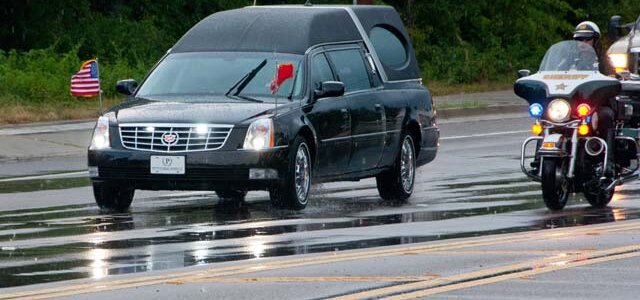Most drivers in Georgia follow the long-standing tradition of slowing down and stopping while a funeral procession passes, even when the law states they’re not required to.
Georgia code 40-6-76 details the rules of the road for drivers who find themselves unsure of how to behave when they come upon a funeral procession. The code reads as follows:
(a) As used in this Code section, a “funeral procession” means an array of motor vehicles in which the lead vehicle displays a sign, pennant, flag, or other insignia furnished by a funeral home indicating a funeral procession unless led by a state or local law enforcement vehicle and each vehicle participating in the funeral procession is operating its headlights.
(b) Funeral processions shall have the right of way at intersections subject to the following conditions and exceptions:
(1) Operators of vehicles in a funeral procession shall yield the right of way upon the approach of an authorized emergency vehicle or law enforcement vehicle giving an audible and visual signal; and
(2) Operators of vehicles in a funeral procession shall yield the right of way when directed to do so by a traffic officer.
(c) Funeral processions escorted by the police, a sheriff, or a sheriff’s deputy shall have the right of way in any street or highway through which they may pass. Local governments may, by ordinance, provide for such escort service and provide for the imposition of reasonable fees to defray the cost of such service.
(d) The operator of a vehicle not in a funeral procession shall not interrupt a funeral procession except when authorized to do so by a traffic officer or when such vehicle is an authorized emergency vehicle or law enforcement vehicle giving an audible and visual signal.
(e) Operators of vehicles not a part of a funeral procession shall not join a funeral procession by operating their headlights for the purpose of securing the right of way granted by this Code section to funeral processions.
(f) The operator of a vehicle not in a funeral procession shall not attempt to pass vehicles in a funeral procession on a two-lane highway.
(g) Any person violating subsection (d), (e), or (f) of this Code section shall be guilty of a misdemeanor and, upon conviction thereof, shall be punished by a fine not to exceed $100.00.
(h) Any law enforcement officer who is directing or escorting a funeral procession in this state, whether such service is provided while on duty or not, shall enjoy the same immunities from liability as the officer possesses while in the performance of other official duties.
Funeral Procession Auto Accidents
While some people think it’s respectful to pull over and let the funeral procession pass, there’s no Georgia law that says you must. In fact, pulling over and stopping for a funeral procession has been the cause of several car accidents over the years. One such accident occurred In June 2016 when a one-year old child was killed after a car crashed into the rear of the vehicle in which she was travelling after the driver attempted to pull over to let a funeral procession pass.
Below are common accidents that occur during a funeral procession:
- Getting t-boned by an oncoming car while travelling through an intersection. Cars approaching an intersection may not realize there is a funeral procession passing through if there is not a uniformed officer to alert them.
- Getting rear-ended when stopping for a funeral procession. Georgia drivers travelling in the opposite direction of a funeral procession are not required to stop. When a driver slows down and pulls over on a curve or just over a hill, oncoming cars travelling behind them may not realize until it’s too late that the cars in front of them have stopped.
Who’s at Fault?
Drivers should proceed with caution if traveling in a funeral procession and not assume that because they’re in the procession they’re safe from being in an accident or free from fault should one occur.
So who is at fault when an accident occurs during a funeral procession? As with any accident, it depends on who was following the law and who was negligent.
It can be confusing to determine who was at fault after an accident that inovolves one car traveling in a funeral procession and another car that’s not traveling in the procession with both drivers thinking they had the right-of-way. One such incident occurred in Missouri in 2013 when a woman traveling through a red traffic light with a funeral was hit by a motorcyclist traveling through the green light. Both thought they had the right-of-way. In the end, the motorcyclist sued the funeral home, not the woman driving the vehicle, claiming the funeral home was the negligent party in the crash.
Just because you are part of a funeral procession, doesn’t mean you’re absolved of any fault if you are involved in an accident with another vehicle. In addition, slowing down or stopping for a funeral procession to pass might be the polite thing to do, but if it causes an accident you might be held liable for injuries to victims.
Auto accidents that occur during a funeral procession can be tricky and each of them is likely to be different. Therefore, each must be looked at separately to determine who may be at fault.
Gautreaux Law is a full service personal injury law firm that handles all types of auto accidents. If you’ve been injured in an auto accident then we may be able to help. You may contact our firm directly at 478-238-9758 or complete a contact form on our website to get help with your particular situation. We will speak with you free of charge to determine if you have an injury claim and what your case is worth.


